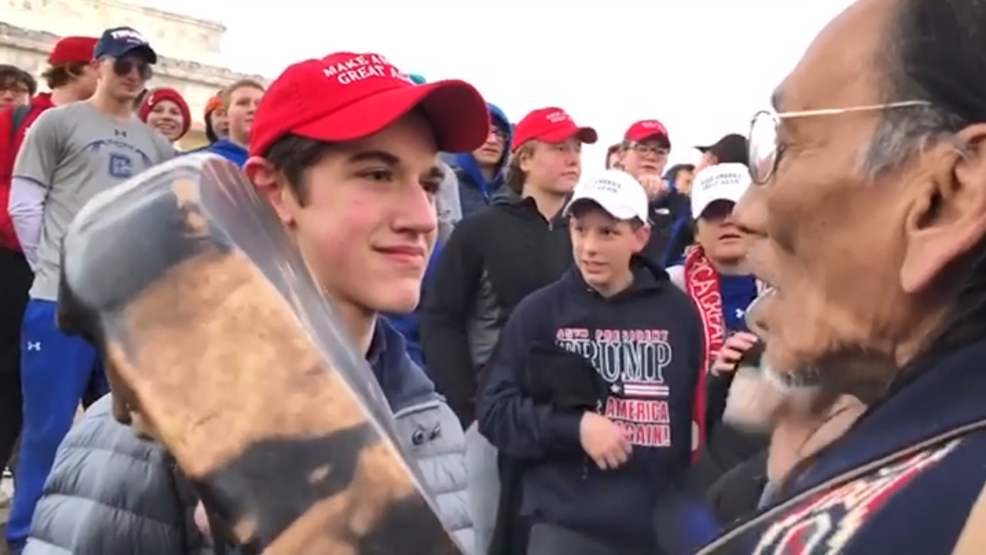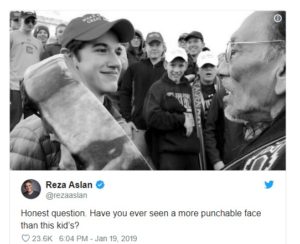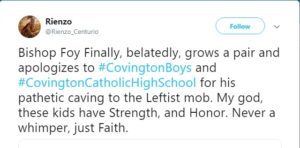
Simplistic thinking and knee-jerk reaction is a problem these days. There used to be more a little more nuance in people’s thinking, some acknowledgment of grey areas. Not anymore, it seems. We live in a world of black and white.
I was watching Twitter this week when the #CovingtonBoys met Nathan Phillips. People looked at that now famous image and jumped to all sorts of conclusions about what happened. Pretty much every conclusion to which anyone jumped was wrong because they jumped from simplistic assumptions. A week has passed and some people are still looking at the incident through stereotypes.
With this binary thinking, there are clear good guys and clear bad buys. Heroes in white hats and villains in black hats. But this isn’t reality; there were no black and white hats at the Lincoln Memorial last Saturday–just grey (and red).
The Sainthood and The #Covingtonboys
 There were a lot of people who saw the students from Covington High school as saints. Others see them and want to respond with violence. The reasons for both reactions are the same.
There were a lot of people who saw the students from Covington High school as saints. Others see them and want to respond with violence. The reasons for both reactions are the same.
- They are Christian.
- They are obviously conservative
- They are wearing MAGA hats.
The Sainthood of Nathan Phillips
There’s a whole other batch of people that instantly saw Phillips as the saint. Their evidence?
- He is a U.S. Marine Veteran.
- He is an Omaha Tribal elder.
- He must be liberal.
TheCovingtonBoys are not Saints
I work with High School students. They are all capable of much good and we celebrate this when we see it, but they are all capable of many forms of vice or folly. They are like every other human being on the planet except they are young. Consequently, both their good and their evil are a little more exuberant.

I am going to disagree with Rienzo, who seems to equate the boys to Christian martyrs facing lions in the Colleseum.
In this group of students, as in most groups, you will see a mix of good, bad and foolish.
They are Christian: Not all Christians are good. I would go so far as to say, “No Christians are good.” I wouldn’t be so bold, except the Bible says it. For it puts Christians in the larger category of being human. I will concede that there is a lot more hostility directed toward Christians in the media these days. But, it is not at all helpful for Christians to automatically come to the defense of other Christians, just because they are Christian. We can expect evil within our midst. And the best course of action is to deal with it.
It’s equally ridiculous to demonize all Christians. For one thing, the standard by which Christians are being demonized is a Christian standard. Secondly, many of the offenses for which Christians are accused are not Christian or at least not exclusively Christian, but human nature expressed through religion and politics.
Every Christian is also human. That means they will sometimes do good things, but it also guarantees that they will also do evil. Consequently, we will have to condone or condemn their words and deeds, one at a time. This is not convenient, but it is moral.
They are conservative: This doesn’t automatically make them good people, but it doesn’t automatically make them bad people either. There are good reasons behind social and economic conservatism. And there are problems with it as well. Let’s admit this fact, instead of automatically and thoughtlessly condoning or condemning. Meaningful dialogue is the only way to tease out the truth and the falsehood from these positions. Meaningful dialogue and name-calling are mutually exclusive.
I don’t understand Christians who are completely comfortable under the conservative label when a good chunk of conservative thought runs contrary to the Bible. But even so, they are half right, and it might take some responsible dialogue to determine when, where and why.
They are wearing MAGA hats: This is a hard one. Some people see this as a token of sainthood. It certainly isn’t that. But I try not to think of it as signifying pure, unadulterated evil. It is inseparable from Donald Trump. This means that Christians should be very hesitant to wear them for he represents so much that is contrary to Biblical Christianity.
Of course, the students don’t understand that it’s inappropriate to politicize the March for Life with a Trump hat, but where are the adults? And then I realize that there are probably a lot of adults are wearing them too.
[click_to_tweet tweet=”Of course, the students don’t understand that it’s inappropriate to politicize the March for Life with a Trump hat, but where are the adults? And then I realize that there are probably a lot of adults are wearing them too. #CovingtonBoys” quote=”Of course, the students don’t understand that it’s inappropriate to politicize the March for Life with a Trump hat, but where are the adults? And then I realize that there are probably a lot of adults are wearing them too.”]
Nathan Phillips is No Saint Either
Nathan Phillips is no saint, nor is he likely a villain, but this week, binary thinking reduced him to one or the other. From some perspectives, the evidence for his essential goodness comes from his service in the US military.
He is a Veteran: Partly out of guilt for our treatment of Vietnam War veterans, and partly because of our worship of Freedom, we’ve recast the idea of a soldier as Defender of Freedom. We liturgically show appreciation for the sacrifice of our men and women in uniform at civic celebrations and sporting events. Further, the military is, as always, linked to nationalism. Consequently, our cultural narratives now celebrate our soldiers. Veterans are the good guys. Phillips is a veteran.
Our veneration of Freedom and Nation can lead us to unthinkingly considering all veterans as white-hat heroes, but Nathan Phillips cannot live up to this image. He is only human.
He is an Omaha Tribal elder: This has lately become a powerful signifier or goodness. I recently overheard a woman bashing Christians for being bigots and anti-science. But it was obvious that she held firmly to the now fashionable reverence for Indigenous culture and spirituality that our federal and provincial governments are promoting. I support this promotion, by the way. But with qualifications.
Indigenous Spirituality in a Box
We do well to understand the culture and spirituality of our Indigenous neighbours. There is much to admire and even emulate. But I worry that we are sanitizing and homogenizing this culture. Both Indigenous spirituality and Christianity are inconsistent with the modern liberalism that dominates the political and social scene in Canada often for the same reasons. In the case of Christianity, the differences are emphasized and condemned. In the case of Indigenous culture, the differences are emphasized and patronized and sanitized and then celebrated.
[click_to_tweet tweet=”Both Indigenous spirituality and that of Christianity are inconsistent with the modern liberalism that dominates Canadian politics and education, often for the same reasons. But we condemn the differences in the former and praise them in the latter.” quote=”Both Indigenous spirituality and that of Christianity are inconsistent with the modern liberalism that dominates Canadian politics and education, often for the same reasons. But we condemn the differences in the former and praise them in the latter.”]
We are not taking Indigenous culture and spirituality as it is. We pick and choose the bits that fit our particular political and social narrative. I fear we are we sentimentalizing. And so we fail to understand our neighbours but walk away feeling as if we’ve somehow done right.
I wanted to tell the woman who was bashing Christians and venerating Indigenous spirituality, that 70 percent of Indigenous people are Christian. I suspect this would have been problematic because I don’t think it fits her simplistic narrative.
When I was a kid, the media–movies and television–usually presented Indigenous Americans as aggressive and savage. We’ve come to repent of this racism, but we are in danger of replacing this misrepresentation with another. Disney does this when it presents the Sioux as passive victims in Hidalgo.
We often reduce indigenous culture down to its connection to the land or its respect for elders and ancestors or the dialogic approach to problem-solving or as a complement to secular modernism. These are wonderful aspects of these cultures that we might benefit from, but aren’t we just cherry picking? Aren’t we really assuming a patronizing openness to these particular ideas and in doing so, disrespecting the whole?
[click_to_tweet tweet=”Very rarely do people or things fit neatly into categories of Good and Evil. One of the things we can learn from Indigenous culture is the efficacy of a restorative justice model to teach us that this is so. #CovingtonBoys” quote=”Very rarely do people or things fit neatly into categories of Good and Evil. One of the things we can learn from Indigenous culture is the efficacy of a restorative justice model to teach us that this is so.”]
He must be a liberal: There are two problems here. One is that it’s a simplistic assumption–liberals cannot usually be identified by how they look. The second problem is to assume that if he’s a liberal, he’s a saint or an embodiment of evil. There are good reasons behind social and economic liberalism, but it’s not all good. Meaningful dialogue is the only way to tease out the truth and the falsehood from these positions.
I don’t understand Christians who are completely comfortable under the liberal label when a good chunk of liberal thought runs contrary to the Bible. But even so, they are half right, and it might take some responsible dialogue to determine when, where and why.
Very rarely do people or things fit neatly into categories of Good and Evil. One of the things we can learn from Indigenous culture is the efficacy of a restorative justice model to teach us that this is so. I’m not sure if Phillips is so keen on restorative practices, but we’ll see if he consents to meet with the boys. America needs some Indigenous Peoples’ wisdom in these curcumstances. Ironically, these ways are also Christian. Let’s use, and celebrate both.
If you’d like a nice parable that also bears on this discussion, read “The White Knight” by Eric Nicol.

Leave a Reply